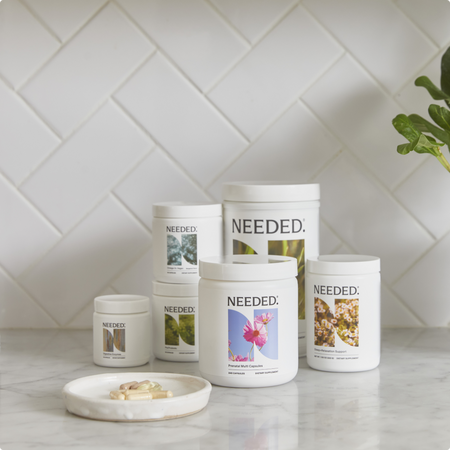Protein has become one of the most talked-about topics in nutrition. From plant-based powders to high-protein snacks, it seems to be everywhere. But while social media is full of advice on “meeting your protein needs,” many women are still unsure how much they actually need or whether they’re getting enough. This guide breaks down the current recommendations, including how protein needs shift during key life stages like pregnancy.
What is the Recommended Daily Protein Intake for Women?
The Recommended Dietary Allowance (RDA) for protein is:
-
0.8 grams per kilogram of body weight per day
-
Or roughly 0.36 grams per pound
This equates to about 46 grams per day for the average sedentary woman, according to the CDC.
However an RDA can be just a guideline as Harvard Health notes:
“The RDA is the minimum amount you need to meet basic nutritional requirements and prevent deficiency - not the amount you're necessarily supposed to eat every day.”
How to Calculate Your Own Protein Needs
To calculate your personalized protein needs, multiply your weight in pounds by 0.36.
For example:
-
A 140-pound woman: 140 x 0.36 = 50 grams of protein per day (RDA minimum)
For a more precise estimate based on age, weight, and life stage, the USDA's Protein Calculator is a useful tool.
Pregnancy: More Protein, For Obvious Reasons
When you're growing a human, protein needs go up, substantially. The Institute of Medicine recommends that pregnant women get 71 grams of protein per day, regardless of trimester.
That supports everything from fetal development to the growth of your own tissues - placenta, uterus, blood supply, and even breast tissue.
If that number feels high, remember:
-
3 oz cooked chicken = 26g
-
1 cup Greek yogurt = 17g
-
1 egg = 6g
-
½ cup lentils = 9g
Just spacing it across meals gets you there quickly.
You can also supplement with Collagen to support what you and your growing baby's body needs during pregnancy, but it is important to note it is not a complete protein.
Perimenopause: When Muscle Loss and Metabolism Hit Differently
During perimenopause and early menopause, estrogen levels begin to decline and with that can come a loss of muscle mass, changes in insulin sensitivity, and shifts in body composition. Protein plays a key role in helping your body adapt.
While the official RDA stays the same (0.8g/kg/day), many clinical nutrition experts and sports medicine researchers point to benefits from increasing to 1.2–1.5g/kg/day - which would mean closer to 80–100 grams per day for many women in their 40s and 50s.
This level is shown to help maintain lean mass, improve satiety, and support strength, all of which become harder to protect with age.
Special Conciderations for GLP-1 medications (Ozempic, Wegovy, Mounjaro): Small meals, Means Higher stakes.
If you’re taking a GLP-1 for diabetes or weight management, your appetite and stomach emptying may be slower. That can make it hard to meet your nutrient needs, especially for protein.
Why that matters:
-
You may be losing weight rapidly
-
That weight loss can include muscle, not just fat
-
Nausea or fullness might lead to unintentionally skipping protein-rich meals
While the RDA still technically applies, clinical guidance often recommends prioritizing high-quality protein at every small meal and snack and being especially mindful of meeting that 46–71g/day minimum to help preserve lean mass and function.
But it’s Not Just About Protein, Fiber Matters, Too
As we dial up protein, we can’t forget fiber a nutrient most women are chronically under-consuming and one that we can’t discount to support healthy bodlily functions.
The minimum recommended daily intake of fiber is:
-
25 grams per day for adult women
-
28 grams per day during pregnancy
Fiber is essential for:
-
Supporting gut health and digestion
-
Regulating blood sugar
-
Managing estrogen levels through regular bowel movements
-
Promoting satiety and weight stability
It’s especially important for women experiencing hormonal shifts, which can slow digestion and lead to constipation.
Good sources include:
-
Lentils (8g per ½ cup cooked)
-
Chia seeds (10g per 2 tbsp)
-
Raspberries (8g per cup)
-
Cooked oats (4g per ½ cup)
Adding more fiber while increasing protein, especially from plant sources creates a more balanced, sustainable approach to feeling nourished and energized.
What a Day of 75–100g of Protein Actually Looks Like
You don’t need to eat a steak at every meal. Here’s a realistic day:
|
Food |
Protein (g) |
|
2 eggs |
12g |
|
1 slice whole grain toast with nut butter |
8g |
|
1 cup Greek yogurt |
17g |
|
3 oz grilled salmon |
22g |
|
½ cup cooked lentils |
9g |
|
¼ cup almonds |
7g |
|
Total |
~75g |
Add a protein-rich smoothie or another small snack, and you're easily in the 90–100g range without overhauling your diet.
Bottom Line
-
The official RDA for protein is 46g/day for women and 71g/day during pregnancy. That’s the minimum to prevent deficiency.
-
In perimenopause, and for women using GLP-1s, aiming for the higher end of the clinical range (closer to 80–100g/day) may support lean mass, metabolism, and hormone health.
-
Don’t overlook fiber. It’s critical for gut and hormone health, and most women don’t get enough.
You don’t need to obsess over macros—but you do deserve to feel clear, steady, and strong in your body. And for that, a little extra protein (and fiber) might go a long way.
Sources
-
Centers for Disease Control and Prevention. Protein and Nutrition
-
U.S. Department of Agriculture. Dietary Guidelines for Americans, 2020–2025
-
Harvard Health Publishing. How Much Protein Do You Need Every Day?
-
Institute of Medicine. Dietary Reference Intakes: Macronutrients – Protein & Pregnancy
-
Nair KS. Aging Muscle. Am J Clin Nutr. 2005;81(5):953–963.
-
JISSN. Position Stand: Protein and Exercise. J Int Soc Sports Nutr. 2017.
















